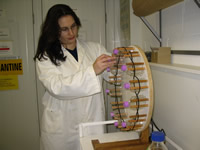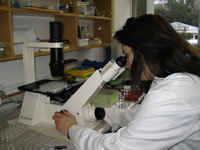|
Where did you grow up and go to school?
I grew up in Hobart and attended Taroona Primary and High Schools. I studied Maths, English, and Environmental, Physical and Sport Science subjects at Hobart College, where I took an interest in environmental science because I like investigating how physical factors affect the plants and animals in our ecosystems.
What captured your interest in science?
Having grown up around the water I recognised the importance of the marine environment and the aquaculture industry to Tasmania. I became aware of the implications of toxic microalgae to the family oyster lease at an early age. I now hope to improve the understanding of toxic algal blooms and contribute to the management of Tasmania marine environment and resources.

What did you study at uni?
I studied a Bachelor of Science at UTAS, which included Psychology, Geography, Microbiology and majors in Botany and Zoology. I then did an Honours degree investigating a specific type of toxic microalgae and how to grow it in laboratory cultures, its growth response to environmental variables, and preliminary analyses of ammonia and fatty acids as a fish killing mechanism in field populations.
How did a summer job turn into a scientific research project?
My studies created an opportunity for me to obtain a summer vacation scholarship studying genetics of oyster growth at CSIRO during my undergraduate program. I was then offered a part-time job there during my Honours year, which allowed me to fit my work in microalgae and bacterial research around my studies. This gave me a valuable opportunity to experience the importance of science in protecting the environment and many important industries. My part time work also gave me additional training and expertise from a wide range of experienced research scientists.
 What are you doing now? What are you doing now?
I'm doing a PhD studying a toxic microalgae called Noctiluca. This species can kill fish, turn seawater bright red and glow in the dark! I run experiments in the laboratory and work with field populations to investigate how the microalgae kills fish. I also model the growth of Noctiluca populations using computer programs to predict when they might affect fish farms. My project has been sponsored by the Aquafin CRC, which offers funding for research as well as great opportunities for training, travel, industry mentors and a chance to participate in broad scale science projects. Studying in science has created opportunities for me to travel interstate and overseas to do field work and present at conferences. When I finish my PhD I hope to travel and work in marine studies in other areas of the world. I would like to do postdoctoral studies and to continue contributing to marine science research.
What do you love about science?
You can learn how to use all kinds of new technologies to study innovative cutting edge questions on any subject you choose. Tasmania's university has brilliant equipment, resources and expertise that allow revolutionary scientific studies that contribute to research and industries all around the world. Scientific study has opportunities for an academic career where you are paid to work on your own passions and contribute to your local community and international industry. My studies have also given me many contacts and opportunities to work in field based hands on occupations around the country.
|
